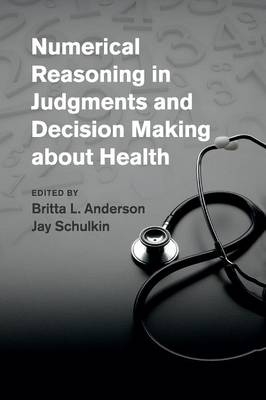
Numerical Reasoning in Judgments and Decision Making about Health
Cambridge University Press (Verlag)
978-1-107-61258-7 (ISBN)
Every day thousands of individuals need to make critical decisions about their health based on numerical information, yet recent surveys have found that over half the population of the United States is unable to complete basic math problems. How does this lack of numerical ability (also referred to as low numeracy, quantitative illiteracy or statistical illiteracy) impact healthcare? What can be done to help people with low numeracy skills? Numerical Reasoning in Judgments and Decision Making about Health addresses these questions by examining and explaining the impact of quantitative illiteracy on healthcare and in specific healthcare contexts, and discussing what can be done to reduce these healthcare disparities. This book will be a useful resource for professionals in many health fields including academics, policy makers, physicians and other healthcare providers.
Britta L. Anderson is a Research Associate at the American College of Obstetricians and Gynecologists. Jay Schulkin is the Senior Director of Research in the Division of Practice at the American College of Obstetricians and Gynecologists. He is also a Research Professor of Neuroscience at Georgetown University, Washington DC and Research Professor in the Department of Obstetrics and Gynecology at the University of Washington.
Introduction Britta L. Anderson and Jay Schulkin; 1. Measuring numeracy Edward T. Cokely, Saima Ghazal and Rocio Garcia-Retamero; 2. Collective statistical illiteracy in health Jan Multmeier, Wolfgang Gaissmaier and Odette Wegwarth; 3. Physicians' understanding and use of numeric information Britta L. Anderson and Jay Schulkin; 4. Patient numeracy: what do patients need to recognize, think, or do with health numbers? Brian J. Zikmund-Fisher, Gillian Mayman and Angela Fagerlin; 5. Application of numeracy in diabetes mellitus chronic disease care Jillian Berkman and Kerri L. Cavanaugh; 6. Numeracy and genetic screening Stephanie Dukhovny and Louise Wilkins-Haug; 7. Using visual aids to help people with low numeracy make better decisions Rocio Garcia-Retamero and Edward T. Cokely; 8. Anticipating barriers to the communication of critical information Ellen Peters; 9. Rational healthcare Ronald Paulus and Walter F. Stewart; 10. A review of theories of numeracy: psychological mechanisms and implications for medical decision making Valerie F. Reyna and Priscila G. Brust-Renck; 11. Do the numbers help patients decide? Ethical and empirical challenges for evaluating the impact of quantitative information Peter H. Schwartz; Conclusion Britta L. Anderson and Jay Schulkin.
| Erscheinungsdatum | 01.08.2016 |
|---|---|
| Zusatzinfo | 21 Tables, black and white; 25 Line drawings, black and white |
| Verlagsort | Cambridge |
| Sprache | englisch |
| Maße | 152 x 230 mm |
| Gewicht | 490 g |
| Themenwelt | Geisteswissenschaften ► Psychologie ► Allgemeine Psychologie |
| Geisteswissenschaften ► Psychologie ► Klinische Psychologie | |
| Geisteswissenschaften ► Psychologie ► Verhaltenstherapie | |
| Mathematik / Informatik ► Mathematik | |
| Medizin / Pharmazie ► Gesundheitswesen | |
| ISBN-10 | 1-107-61258-6 / 1107612586 |
| ISBN-13 | 978-1-107-61258-7 / 9781107612587 |
| Zustand | Neuware |
| Haben Sie eine Frage zum Produkt? |
aus dem Bereich


